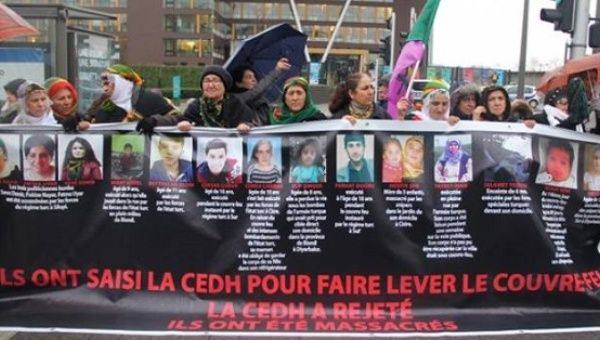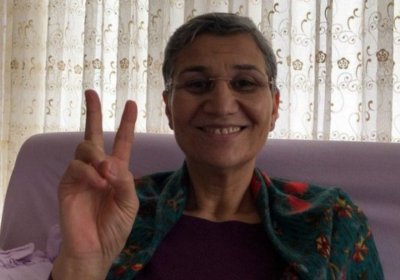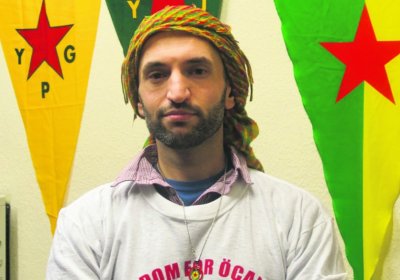Peoples Democratic Party MP, Leyla Güven ended her 200-day hunger strike on May 26, after the Turkish government finally allowed imprisoned PKK leader Abdullah Öcalan to meet with his lawyers.
Abdullah Öcalan
British Labour Party leader Jeremy Corbyn met with Kurdish solidarity activists on March 30, according to the campaign website freedomforocalan.org.
Leyla Guven, a member of Turkey’s parliament for the left-wing, Kurdish-led People’s Democratic party (HDP), launched an indefinite hunger strike on November 7 from Amed Prison, where she was held jailed by Turkey’s regime. Her demand is for an end to the isolation of jailed Kurdistan Workers’ Party (PKK) leader Abdullah Ocalan.
Jailed by Turkey since 1999, Ocalan is the recognised leader of the Kurdish liberation movement. Since 2011, his lawyers have been unable to met with him.
On January 20, Turkey launched an invasion of Afrin, one of the three cantons that make up the Democratic Federation of Northern Syria (also known as Rojava), the site of a profound, Kurdish-led social revolution based on multi-ethnic participatory democracy and women’s liberation.
The invasion has killed dozens of civilians in an area that has welcomed hundreds of thousands of refugees from Syria’s conflict. Turkey’s actions would be impossible without at least passive acceptance from several great powers active in Syria. Cihad Hammy looks at the motivations for various major players.
Syrian Democratic Forces (SDF) finally liberated Raqqa, in northern Syria, from ISIS occupation on October 17, after a battle of 135 days. In 2014, ISIS declared Raqqa its capital, which makes its defeat a decisive event.
The SDF is a multi-ethnic and multi-religious armed force made up of dozens of militias that is committed to the political project of “democratic confederalism”, the participatory democratic project associated with the Kurdish-led Rojava Revolution.
The Kurdish people are an oppressed nationality without a state, whose homeland is currently divided between five countries in the Middle East. Despite this, the left-wing Kurdish movement in Syria’s north is not fighting for a separate nation state. Rather, it is seeking to unite all ethnic groups and religions to fight for an autonomous, participatory democracy as part of a profound social movement that puts women’s liberation at its heart.
A large minority in Turkey, at about 20% of the population, the Kurdish people have long faced systemic discrimination by the Turkish state. This has included massacres and violent repression of their culture, with even the Kurdish language banned until recently.
Such oppression led to the Kurdistan Workers’ Party (PKK) launching an armed struggle for national liberation in 1984. In recent years, the PKK — whose leader Abdullah Öcalan remains in solitary confinement in a Turkish jail — has declared its commitment to a peaceful solution to the conflict.
British Labour Party leader Jeremy Corbyn told a meeting in London on September 15 that the Kurdish people’s right to self-determination needed to be recognised, Firat News Agency said the next day. The meeting was organised by the British Kurdish People’s Assembly.

Hunger strikers begin their fast for Öcalan in Diyarbakır on September 5.
A hunger strike was launched in Turkey’s Kurdish capital Diyarbakır on September 5 by politicians and activists demanding a meeting with jailed Kurdistan Workers’ Party (PKK) leader Abdullah Öcalan.
 Flag of PKK with image of Abdullah Ocalan.
Millions of Kurds view Abdullah Öcalan as their political representative. His freedom is directly linked to a democratic and peaceful solution to the war in Turkey.
Flag of PKK with image of Abdullah Ocalan.
Millions of Kurds view Abdullah Öcalan as their political representative. His freedom is directly linked to a democratic and peaceful solution to the war in Turkey.
 Kurdish women staged a sit-in in Strasbourg against the silence of European institutions over Turkey's crime
A coalition of pro-Kurdish European groups held a five day sit-in in front of European institutions in Strasbourg in eastern France, starting on February 23, to protest Europe's silence on the Turkish government's ongoing massacre of Kurds. The action targeted the European Court of Human Rights.
Kurdish women staged a sit-in in Strasbourg against the silence of European institutions over Turkey's crime
A coalition of pro-Kurdish European groups held a five day sit-in in front of European institutions in Strasbourg in eastern France, starting on February 23, to protest Europe's silence on the Turkish government's ongoing massacre of Kurds. The action targeted the European Court of Human Rights.
 Turkish police repress protests against Erdogan's renewed war.
The outcome of Turkey’s June 7 parliamentary elections promised so much.
Turkish police repress protests against Erdogan's renewed war.
The outcome of Turkey’s June 7 parliamentary elections promised so much.
- Previous page
- Page 3







